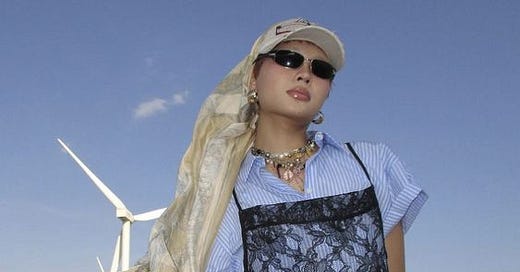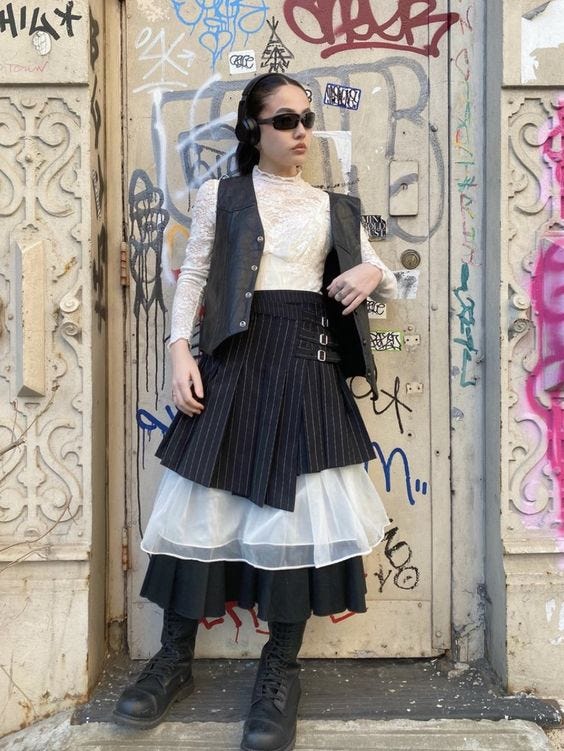is pinterest inspo detrimental to personal style?
how the platform capitalizes on inspiration and your creativity + the antidote to copy-pasting
The highest honor a fashion girlie can achieve these days is to be pinned to another fashion girlie's Pinterest “outfit inspo” board. It’s a dose of validation that ‘it’ girls must feel daily. You become the source of inspiration that every other fashion girlie wants to emulate. Over the last decade, Pinterest has become the internet's go-to resource for “inspiration.” I mean, that’s essentially the idea the platform was founded on: a place to collect and curate all that inspires you, ranging from DIY home decor to fashion. The platform's evolution and influence have also led to the word “Pinterest” becoming an adjective in the world of fashion. Depending on which aesthetic realms you align with, your definition of a Pinterest outfit may differ, but a few things about them are universal: 1. They photograph well, 2. They adhere to current trends to some degree, and 3. They inspire replication. Most of us have turned to Pinterest before when trying to ignite a burst of creativity, but recently, I’ve begun to question how much of the curated content I view on the platform is true inspiration and how much of it is actually the antithesis of inspiration, instead a subconscious pressure to consume.
I’m thinking about the idea of the “pinterest outfit” and its role in defining style trends and promoting overconsumption because I just started oldloserinbrooklyn’s 75 Hard Style Challenge. Introduced at the start of this year, the 75 Hard Style Challenge involves committing to getting dressed every day for 75 consecutive days. It aims to encourage thoughtful dressing, self-discovery regarding personal style, and reduced consumption.
As I went through the challenge's rules, which all seemed logical – “set goals and intentions, dress daily, organize and declutter your closet…” – one rule caught my attention as unconventional: “get creative and rely on your own brain for inspiration,” AKA no searching for inspiration on Pinterest. Initially, I thought this rule was a bit unfair. After all, the greatest artistic creations are often inspired by another. However, upon deeper reflection, I realized something significant. Our primary source of inspiration, Pinterest, often encourages imitation more than genuine inspiration. This, in turn, fosters a culture where shopping becomes the quickest path to replicating these inspirations.
In the context of inspiration, "commodification" refers to the process of turning ideas, creativity, and originality into marketable products or commodities. Pinterest's algorithm and user interface often prioritize popular or trending content, leading users to perceive inspiration as something to be consumed or acquired rather than cultivated organically. The business model of Pinterest, which includes promoting sponsored content and affiliate marketing, can influence how users interact with content by subtly shaping their preferences and encouraging consumption-driven behavior.
If you’ve ever been enamored by a Pinterest outfit, you've probably noticed its "shop similar" function. When you click on the image, the platform categorizes the photo based on pieces and links you to similar items that you can purchase. If that doesn’t help you find a similar piece, their “image search” function works like a reverse image search, helping you locate the original source of the image, which can help you find the piece or brand.
If I wasn’t viewing Pinterest as a cog in the capitalist machine, the feature is a genuinely helpful inspiration source when trying to find a creator to follow or trace the original source of a photo. However, as useful as this feature can be for sourcing things we admire online, it feels like we're no longer only being inspired by a look but also being pressured to purchase it. Moreover, anyone who has developed their personal style based on their design preferences and life experiences may find that their unique style is turned into an "aesthetic" trend, a formula, that can be bought and replicated. (This commodification process can also be linked to the death of true fashion subcultures, but that’s a conversation for another post). Pinterest turns us and our genuine creativity into something that can be profited from.
So much of our digital experiences are curated by algorithms that I can’t help but wonder, (insert Carrie Bradhsaw writing style joke here) is discovery outside of our comfort zones now limited to irl experiences? Algorithms are designed to learn what we like, but are they also helping us to remain stagnant in our personal (style) development and only to change when it means copying some whose image we inspire to have? When are we truly discovering new things and how do we know we’re not just being fed more of what the algorithm already knows we like? Ms. Mandy Lee recognizes that relying too heavily on Pinterest for creative ideas limits innovation and originality, as referring to outfits popular on the platform promotes replication and trends rather than the exploration unique concepts. In fact, the algorithm knows me so well (or is just watching my every move) that while I took a TikTok break from writing this, a video by one of my favorite TikTok fashion commentators, Yola, came across my FYP where she shares a similar sentiment,
“copy pasting an outfit off of Pinterest is like never moving past being a teenager and your whole identity being built around having the one trendy piece that the cool girl in school has. Building real personal style is learning to tell when you like something aesthetically on someone else and when you like it for yourself.”
Facts. She also offers an antidote. In her following post, she notes she hasn’t been using Pinterest to save full outfits anymore and now focuses more on the foundational aspects of an outfit that she values, like color and texture. It’s a revelation I’ve also recently had about my own personal style. I’ll preface this by saying that this theory could totally already exist, buuuut it occurred to me recently that if I consider style and clothing from four perpectives — print, texture, shape, and color — and rank their importance in relation to how I understand myself, my emotions, and my birth chart (lol), I realize my order of prioritization is 1. texture 2. shape 3. print and 4. color.
Based on this, I also realized that while I appreciate fashion that plays with color and pattern, it doesn't align with my personal visual narrative (my inner colors are earth tones and I’m at home when I wear a similar palette). This disconnect, between appreciating something aesthetically and understanding how it fits into one's inner self-expression, is what Pinterest commodifies. It's what prevents us from reaching these insights about ourselves and our style. The only way to truly figure this out is to do mushrooms and experience ego death. Kidding (ish). What you actually need to do is identify the aspects of the physical world that truly inspire your soul — like nature, music, and emotion — and making an effort to translate those influences into your physical appearance.
As a self-proclaimed hedonist, I never thought I’d question any hyper-beautiful space, but it goes to show the “dangers” of curated app experiences like that of Pinterest. If the worlds Pinterest presents us are nothing but beautiful, how then do we learn to create beauty from the mundane? The curated experience of Pinterest offers a structured and visually appealing way to discover content, but it also limits genuine exploration and serendipitous discovery, and makes us forget the authentic nature of inspiration found outside of curated platforms.
Now don’t get me wrong, I enjoy the dose of dopamine I get from scrolling through Pinterest and seeing pretty clothes as much as the next girl, and I still think there is a lot of value that can come from sharing your tastes and viewing others'. I just think we can make an effort to mindfully consume the media we’re presented with, just like we should mindfully consume anything in this capitalist-hellscape, in an effort to protect as many aspects of ourselves from consumer corruption as possible. Did that make sense?
LMK YOUR THOUGHTS BESTIE!!!







